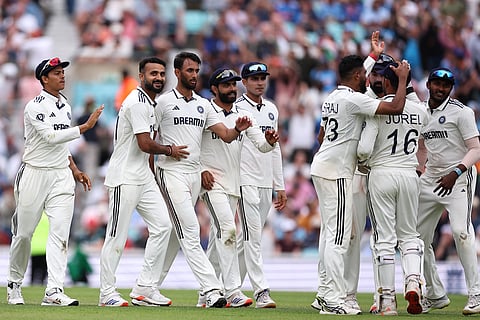Why Test cricket still rules: The Oval finale captures format’s soul
With five-match series going to the wire, Moody says five-day game remains the best

Dubai: Few series have captured the essence and thrill of Test cricket like the India-England five-match duel that has gripped audiences over the past month. Heading into the final day of the fifth Test at The Oval, England require 35 runs, India need four wickets, and the crowd awaits what could be a classic finish.
It’s a storyline that vindicates the relevance of the longest format, a sentiment echoed strongly by former Australia all-rounder and current Desert Vipers head coach Tom Moody.
“A lot of people question the future of Test cricket,” Moody said during a recent interaction with Gulf News after the retention for the ILT20 Season 4. “We know it’s not the most profitable format in many places, but there is still a unique charm about it. Ask any player what they want to master — it’s still Test cricket. It is the holy grail of the game.”
India’s spirited comeback in the second Test and England’s audacious chase in the opener at Headingley have added layers of drama and character to the series that has gone to the wire. Moody pointed to India’s transition post the retirements of Rohit Sharma and Virat Kohli as a revelation.
“Many were unsure how India would perform after the exits of Kohli and Rohit, but it’s allowed new talent to emerge. And what we’ve seen is that there’s no shortage of that in Indian cricket,” he said. “Shubman Gill, for instance, has taken to captaincy like a duck to water. It hasn’t affected his batting. If anything, he looks hungrier.”
One of the central figures in India’s campaign has been Mohammed Siraj, who now leads the wicket charts with 20 dismissals. In the absence of Jasprit Bumrah, Siraj has embraced the mantle with fiery spells and relentless energy. Bowling coach Morne Morkel praised him as a “natural leader” and someone who “always puts his hand up” in crunch moments.
For Moody, performances like these reaffirm why Test cricket remains the ultimate examination of a cricketer’s resolve. “It’s the format where you build technique, learn to handle pressure, and understand the game deeply. All that can’t be replicated in white-ball cricket.”
Moody also acknowledged how global headlines, from the India-England series to Australia’s nail-biter against the West Indies and Wiaan Mulder’s near-record triple century for Zimbabwe, show Test cricket’s enduring value. “It’s blockbuster stuff now. The pace has changed, and the game produces more results and drama than ever before.”
UAE’s rise and realities
Turning to his role as Desert Vipers coach, Moody reflected on the UAE’s progress. “It’s about patience,” he said. “Unlike nations with a century-long cricket culture, UAE is still building. But the growth has been significant — both in terms of infrastructure and the skill levels of local players.”
Moody credited the ILT20 as a development engine, citing how pressure performances — not just nets — have shaped UAE talent. “We’ve seen their mental skills and technical application evolve under pressure. That only happens in game scenarios, not just training.”
Asked what’s still holding UAE back from global recognition, Moody pointed to the need for consistent results at associate level and beyond. “Once the national team starts stringing together successful campaigns, the spotlight will naturally follow.”
He believes experienced overseas professionals — players and coaches — can accelerate UAE’s development. “It creates a two-way learning environment. Young UAE players gain world-class insights, and even we learn from engaging with their journey.”
Franchise future and format foundation
With ILT20 Season 4 around the corner, Moody shared that the Desert Vipers aim to build on three successful campaigns. While eight-player retention limits meant letting go of some long-serving stars like Alex Hales, he remains confident in the team culture they’ve built. “We’ve tried to be consistent and loyal, but sometimes strategy and rules dictate tough calls.”
Moody also weighed in on the ongoing debate around franchise leagues vs international longevity. Referring to players like Nicholas Pooran retiring early from international cricket, he said, “It’s a personal choice. The cricketing landscape has changed. These players have to juggle career, family and physical tolls.”
However, he offered a clear message to emerging players: “The red-ball game is still the best foundation. It builds resilience, mental toughness, and all-round skill — traits essential for long careers, whatever the format.”
In many ways, the India-England series — and performances from players like Siraj — have reinforced this very idea. As Moody summed it up: “When Test cricket is played with such spirit and skill, it reminds everyone why it still matters.”




